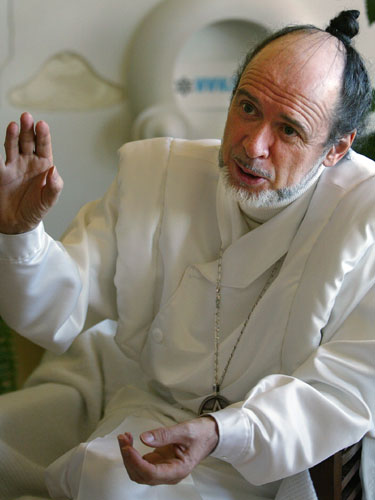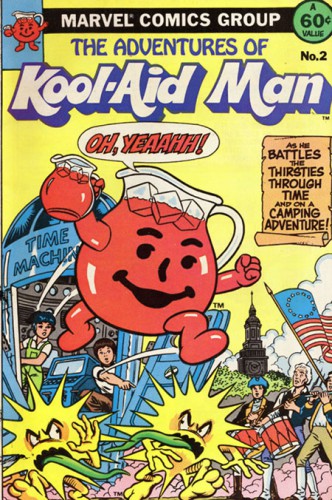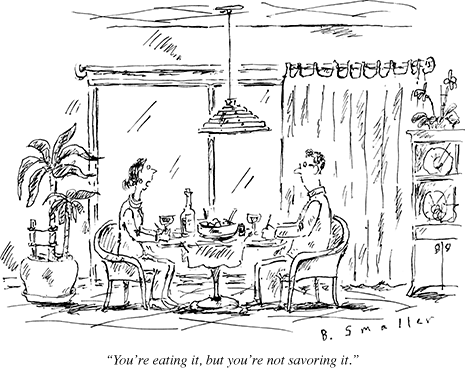
 It’s been coming for a while now, but this past month may have been the tipping point. For the first time, more of the TV viewing in our household had to do with food than not. The new episodes of Top Chef were the least of the culprits. I’m talking about entire seasons of The Mind of a Chef and No Reservations, about on-demand movies like The Trip to Italy and Chef. (They’re all pretty great, btw). The only thing saving us from drowning in our own saliva was fresh Portlandia on Netflix. That show’s relentless, hilarious lampooning of foodie-ism was just the artisanal tonic we needed, easy target or no.
It’s been coming for a while now, but this past month may have been the tipping point. For the first time, more of the TV viewing in our household had to do with food than not. The new episodes of Top Chef were the least of the culprits. I’m talking about entire seasons of The Mind of a Chef and No Reservations, about on-demand movies like The Trip to Italy and Chef. (They’re all pretty great, btw). The only thing saving us from drowning in our own saliva was fresh Portlandia on Netflix. That show’s relentless, hilarious lampooning of foodie-ism was just the artisanal tonic we needed, easy target or no.
At the end of September, The NY Times published a fascinating little column by Ross Douthat about “The Cult Deficit”, which provided the basis for my talk at our conference in Texas. It would appear that religious cults–of the Moonie/Heaven’s Gate/Jonestown variety–are on the wane, and that’s not necessarily a good thing. What I tried to say in Houston, and what last month’s DVR queue confirmed, is that that prognosis might be a superficial one. Cults are everywhere. They may no longer be outwardly spiritual in nature, but they function as religiously as ever. It’s almost hard to keep up. I’m talking about the cult of success, the cult of productivity, of fitness, etc.
Gee, Dave, “cult” sounds like a strong word. Aren’t these things simply secularized religions? Perhaps, I don’t know. When I think of the cults that made the news when I was a kid, I think of fanatics pulling stunts that look not just strange but insane to those who don’t share their values (or religious framework). “Drinking the Kool-Aid”, etc. I think of communities bound together by eccentric leaders and their extreme standards of purity, authoritarian structures that demand everything of their followers, and brook no resistance. All law and no grace, in other words. Which is what I see when I look at the Cult of Self and its many subsidiaries (especially observing my own crazed responses to its mandates). As we’re so fond of saying, the religious impulse is alive and well in the West. Just watch… Top Chef! We have put the ‘cow’ back in ‘sacred cow.’
 We’ve posted a number of times before about the religiosity creeping into our food culture of late. Not only is the kitchen a venue where we get to pursue purity full throttle, not only does it, er, cater to our desire for control (“eat this and you will become ____”), not only does it resonate with the veneration of creativity, it also is a realm where objectivity still (theoretically) exists, where judgments can safely be pronounced, where categories like Good and Bad have meaning and cannot be explained away by context or brickwalled by political implications. You either pickled those those ramps well, or you didn’t. I’m fairly certain this is one of the chief reasons why these shows are so engulfing and fun to watch. That and Padma. (That food and sex have become such frequent bedfellows should come as no surprise – Costanza is a prophet after all).
We’ve posted a number of times before about the religiosity creeping into our food culture of late. Not only is the kitchen a venue where we get to pursue purity full throttle, not only does it, er, cater to our desire for control (“eat this and you will become ____”), not only does it resonate with the veneration of creativity, it also is a realm where objectivity still (theoretically) exists, where judgments can safely be pronounced, where categories like Good and Bad have meaning and cannot be explained away by context or brickwalled by political implications. You either pickled those those ramps well, or you didn’t. I’m fairly certain this is one of the chief reasons why these shows are so engulfing and fun to watch. That and Padma. (That food and sex have become such frequent bedfellows should come as no surprise – Costanza is a prophet after all).
Anyway, all this is a prelude to the excellent New Yorker article by John Lanchester, “Shut Up and Eat”, in which he recounts his personal journey to the end of foodie righteousness. Some might say it’s downright courageous how clearly he spells out the identity factors at work, the undeniable class consciousness, the existential stakes simmering underneath so much of our culinary life, ht KW:
Once upon a time, food was about where you came from. Now, for many of us, it is about where we want to go—about who we want to be, how we choose to live. Food has always been expressive of identity, but today those identities are more flexible and fluid; they change over time, and respond to different pressures. Some aspects of this are ridiculous: the pickle craze, the báhn-mì boom, the ramps revolution, compulsory kale. Is northern Thai still hot? Has offal gone away yet? Is Copenhagen over? The intersection of food and fashion is silly, just as the intersection of fashion and anything else is silly. Underlying it, however, is that sense of food as an expression of an identity that’s defined, in some crucial sense, by conscious choice. For most people throughout history, that wasn’t true. The apparent silliness and superficiality of food fashions and trends touches on something deep: our ability to choose who we want to be.
By the end of the twentieth century, it seemed that more or less the entire developed world was shopping and cooking and dining out in a way that was given over to self-definition and self-expression and identity-creation and trend-catching and hype and buzz and the new new thing, which sometimes had to do with newness (foams! gels! spherification!) and sometimes with new ways of being old (slow food! farm-to-table! country ham!)…
Most of the energy that we put into our thinking about food, I realized, isn’t about food; it’s about anxiety. Food makes us anxious. The infinite range of choices and possible self-expressions means that there are so many ways to go wrong. You can make people ill, and you can make yourself look absurd. People feel judged by their food choices, and they are right to feel that, because they are…
https://www.youtube.com/watch?v=sEndZuu44ww
Not so long ago, food was food… That’s not true anymore. Food is now politics and ethics as much as it is sustenance. People feel pressure to shop and eat responsibly, healthfully, sustainably. At least, that’s the impression you get from what’s written and said about food culture—that it’s a form of surrogate politics. To some, it’s not even surrogate politics; it’s the real deal, politics at its most urgent and consequential. Alice Waters presents the case beautifully: “Eating is a political act, but in the way the ancient Greeks used the word ‘political’—not just to mean having to do with voting in an election, but to mean ‘of, or pertaining to, all our interactions with other people’—from the family to the school, to the neighborhood, the nation, and the world. Every single choice we make about food matters, at every level. The right choice saves the world.”…
If shopping and cooking really are the most consequential, most political acts in my life, perhaps what that means is that our sense of the political has shrunk too far—shrunk so much that it fits into our recycled-hemp shopping bags. If these tiny acts of consumer choice are the most meaningful actions in our lives, perhaps we aren’t thinking and acting on a sufficiently big scale. Imagine that you die and go to Heaven and stand in front of a jury made up of Thomas Jefferson, Eleanor Roosevelt, and Martin Luther King, Jr. Your task would be to compose yourself, look them in the eye, and say, “I was all about fresh, local, and seasonal.”
Ha! Perhaps “religious” really is the only word for it. Never mind that it’s “not what goes into the mouth that defiles”.

Speaking as someone who has no idea what a healthy relationship with food (or health!) might look like–my own is saturated in emotion and reward–the point here is not that good food is bad, or even that the love of good food is bad. That’s both a contradiction and an absurdity. How could anyone be against deliciousness? Or health? Food is a gift. Cooking can be an art form. Jesus ate with people all the time. Anthony Bourdain is a badass.
The problem lies, as it always does, with our, uh, insatiable appetite not for self-definition but self-justification, even self-salvation. It lies with the weight we place on things that cannot and were never meant to bear them, the way we turn good things into ultimate things, communities into cults. Food may seem like a transparently silly thing to invest with so much authority, but here we are. And I for one would still rather live in a town that worships food than one that doesn’t. At least for now. Hit me up in a couple of years, though, after the gourmet BBQ bubble bursts.
This morning, I told my four year-old son that if he ate any more (organic) orange slices, he might turn into one. It was the first time I had used that particular, time-honored ruse, but not for a second did he believe me. In fact, he thought it was the funniest thing he had ever heard. I guess I didn’t have to tell him that we are not what we eat, and that that is good news indeed.

COMMENTS
4 responses to “When a Foodie Repents”
Leave a Reply













ha, ha hadn’t seen that Jello Biafra Portlandia spot!
Read the referenced article this weekend. Great article and great reflection on it DZ!
My take:
Jesus said, “This cup is the new testament in my blood: this do ye, as oft as ye drink it, in remembrance of me, or as often as ye eat this bread, and drink this cup, ye do shew the Lord’s death till he come . . . For he that eateth and drinketh unworthily, eateth and drinketh damnation to himself, not discerning the Lord’s body.”
He didn’t mean that we should go to a church every day, or week, or month and drink and eat symbolically. He meant that whenever we eat or drink — anything — we should reverence the act as an everyday ceremony of remembrance of who he was. The act of living, indistinguishable from the act of eating and drinking, is instinct with the grace of God. So eating and drinking, like breathing, are sacramental acts — things to be experienced as miracles . . . as oft as we eat, at a McDonald’s or at home on Wednesday.
Communing with food and drink, mindfully, is communing with Jesus, the giver of life, life itself. It can probably be done better at a fast-food drive-through than at a communion rail. So yes — make the best food we can, eat the best food we can, drink the best wine we can, enjoy it to the fullest, celebrate it, not to glorify ourselves but to glorify the shepherd who feeds us, as oft as we drink or eat.